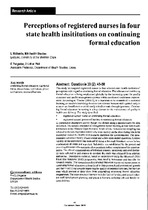Perceptions of registered nurses in four state health insititutions on continuing formal education
Abstract
This study investigated registered nurses in four selected state health institutions’
perceptions with regard to continuing formal education. The relevance of continuing
formal education is being emphasised globally by the increasing quest for quality
assurance and quality management systems within an ethos of continuous improvement.
According to Tlholoe (2006:5), it is important to be committed to continual
learning, as people’s knowledge become less relevant because skills gained early in
a career are insufficient to avoid costly mistakes made through ignorance. Continuing
formal education in nursing is a key element to the maintenance of quality in
health care delivery. The study described:
• registered nurses’ views on continuing formal education
• registered nurses’ perceived barriers to continuing formal education
A quantitative descriptive survey design was chosen using a questionnaire for data
collection. The sample consisted of 40 registered nurses working at four state health
institutions in the Western Cape Province, South Africa. Convenience sampling was
selected to include registered nurses who were on duty on the days during which the
researcher visited the health institutions to distribute the questionnaires. The questionnaire
contained mainly closed-ended and a few open-ended questions. Content
validity of the instrument was ensured by doing a thorough literature review before
construction of items and a pretest. Reliability was established by the pretest and
providing the same information to all respondents before completion of the questionnaires.
The ethical considerations of informed consent, anonymity and confidentiality
were adhered to and consent to conduct the study was obtained from relevant
authorities. Descriptive statistics, based on calculations using the Microsoft (MS)
Excel (for Windows 2000) programme, were used to summarise and describe the
research results. The research results indicated that most registered nurses perceive
continuing formal education as beneficial to their personal and professional growth
and that it could lead towards improving the quality of patient/client care, but barriers
exist which prevent or deter them from undertaking continuing formal education
programmes. The main structural barriers included lack of funding and lack of coherent
staff development planning and physical barriers including job and family responsibilities.

